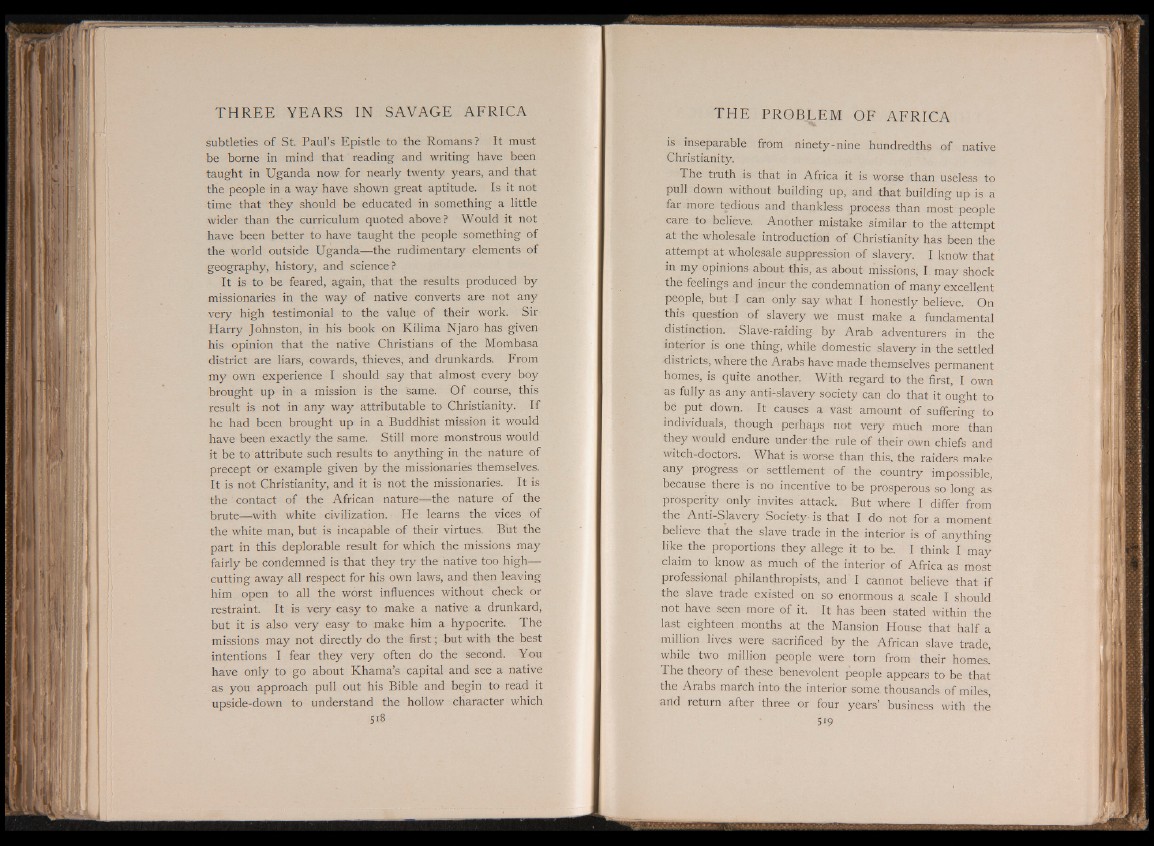
subtleties of St. Paul’s Epistle to the Romans? It must
be borne in mind that reading and writing have been
taught in Uganda now for nearly twenty years, and that
the people in a way have shown great aptitude. Is it not
time that they should be educated in something a little
wider than the curriculum quoted above? Would it not
have been better to have taught the people something of
the \vorld outside Uganda—the rudimentary elements of
geography, history, and science?
It is to be feared, again, that the results produced by
missionaries in the way of native converts are not any
very high testimonial to the value of their work. Sir
Harry Johnston, in his book on Kilima Njaro has given
his opinion that the native Christians of the Mombasa
district are liars, cowards, thieves, and drunkards. From
my own experience I should say that almost every boy
brought up in a mission is the same. Of course, this
result is not in any way attributable to Christianity. If
he had been brought up in a Buddhist mission it would
have been exactly the same. Still more monstrous would
it be to attribute such results to anything in the nature of
precept or example given by the missionaries themselves.
It is not Christianity, and it is not the missionaries. It is
the contact of the African nature—the nature of the
brute—with white civilization. He learns the vices of
the white man, but is incapable of their virtues. But the
part in this deplorable result for which the missions may
fairly be condemned is that they try the native too high—
cutting away all respect for his own laws, and then leaving
him open to all the worst influences without check or
restraint. It is very easy to make a native a drunkard,
but it is also very easy to make him a hypocrite. The
missions may not directly do the first; but with the best
intentions I fear they very often do the second. You
have only to go about Khama’s capital and see a native
as you approach pull out his Bible and begin to read it
upside-down to understand the hollow character which
518
is inseparable from ninety-nine hundredths of native
Christianity.
The truth is that in Africa it is worse than useless to
pull down without building up, and that building up is a
far more tedious and thankless process than most people
care to believe. Another mistake similar to the attempt
at the wholesale introduction of Christianity has been the
attempt at. wholesale suppression of slavery. I know that
in my opinions about this, as about missions, I may shock
the feelings and incur the condemnation of many excellent
people, but I can only say what I honestly believe. On
this question of slavery we must make a fundamental
distinction. Slave-raiding by Arab adventurers in the
interior is one thing, while domestic slavery in the settled
districts, where the Arabs have made themselves permanent
homes, is quite another. With regard to the first, I own
as fully as any anti-slavery society can do that it ought to
be put down. It causes a vast amount of suffering to
individuals, though perhaps not very much more than
they would endure under the rule of their own chiefs and
witch-doctors. What is worse than this, the raiders make
any progress or settlement of the country impossible,
because there is no incentive to be prosperous so long as
prosperity only invites attack. But where I differ from
the Anti-Slavery Society- is that I do not for a moment
believe that the slave trade in the interior is of anything
like the proportions they allege it to be. I think I may
claim to know as much of the interior of Africa as most
professional philanthropists, and I cannot believe that if
the slave trade existed on so enormous a scale I should
not have seen more of it. It has been stated within the
last eighteen months at the Mansion House that half a
million lives were sacrificed by the African slave trade,
while two million people were torn from their homes.
The theory of these benevolent people appears to be that
the Arabs mafch into the interior some thousands of miles,
arid return after three or four years’ business with the
5‘9